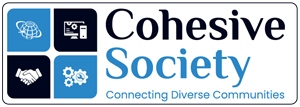Cohesive Society CIC, in partnership with Social Prescriber Northamptonshire, recently conducted a public consultation to assess the health, well-being, and unique challenges faced by the Bangladeshi community in Northamptonshire’s inner-city areas. This two-day event brought together a wide cross-section of the community, allowing for meaningful face-to-face discussions around various health issues. The consultation aimed to gather insights, hear community concerns, and explore solutions to this demographic’s persistent barriers to health and healthcare access. Topics of discussion ranged from general health and mental health to more complex issues like underlying chronic illnesses, language barriers, cultural taboos, and systemic barriers in the healthcare system.
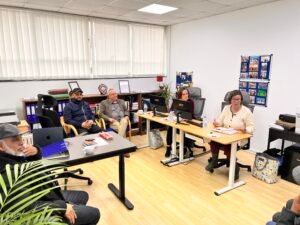
The community turnout was impressive, with many residents eager to share their experiences, observations, and frustrations regarding the state of health services in Northamptonshire. This event highlighted the depth of challenges faced by the community, providing an eye-opening look into the issues that hinder the health and well-being of individuals and families within this group. The discussions underscored the urgency of addressing these issues with empathy, understanding, and culturally sensitive solutions.
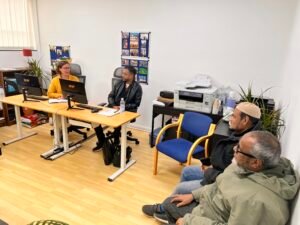
### Key Areas of Concern and Insights from the Consultation
**1. Mental Health and Underlying Health Issues**
Mental health remains a significant concern within the Bangladeshi community, yet it is often regarded as a taboo subject. The consultation revealed that mental health issues, such as anxiety and depression, are widespread. Still, community members are reluctant to seek help due to cultural stigma and a lack of awareness. Many attendees expressed a lack of understanding regarding mental health services and the importance of mental well-being. Language barriers and cultural misconceptions further complicate access to these essential services. Individuals noted that there is limited understanding of mental health as a legitimate health issue and instead view it as a private matter or as something to be managed without professional support.
**2. Barriers to Accessing Primary and Secondary Care**
Challenges in securing timely GP appointments were highlighted as a major problem, with attendees voicing frustration over the current appointment system. Due to limited GP availability, members of the Bangladeshi community often face delays in receiving medical attention. The shift toward telephone consultations, which increased during the COVID-19 pandemic, has exacerbated this problem due to language barriers. Many older community members and those with limited English proficiency struggle to communicate effectively over the phone. This has led to misunderstandings, missed diagnoses, and reluctance to engage with health services.
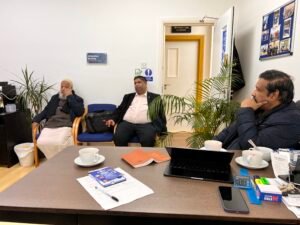
The event also brought attention to the difficulties faced by community members when explaining symptoms to healthcare providers, especially during hospital appointments. Due to language barriers, there is often a gap between patient and provider understanding, which can result in inadequate care or incomplete treatment. Additionally, some individuals feel they are not taken seriously during consultations due to language limitations, which can discourage them from seeking help altogether.
**3. Cultural Taboos and Gender-Specific Health Issues**
The consultation shed light on the reluctance of women within the community to seek help or take proactive steps toward a healthier lifestyle. Cultural expectations and traditional gender roles often prevent women from coming forward to address their health needs. Many women reported feeling discouraged from exercising or engaging in community activities, which contributes to sedentary lifestyles and increased rates of obesity, diabetes, and hypertension. The cultural stigma surrounding mental health is particularly acute among women, who are often expected to prioritize family responsibilities over personal well-being.
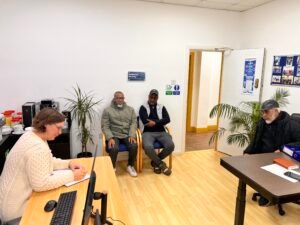
**4. Prevalence of Chronic Conditions and Need for Awareness**
Several chronic health conditions, such as diabetes, obesity, high blood pressure, and COPD (Chronic Obstructive Pulmonary Disease), are prevalent within the Bangladeshi community. Attendees expressed concern over a lack of resources and knowledge regarding managing and preventing these conditions. For instance, there is limited awareness about the symptoms and early warning signs of COPD, which can lead to delayed diagnoses and worsening conditions. The consultation highlighted the importance of education and awareness campaigns to inform the community about managing these health issues.
**5. Language Barriers and the Need for Culturally Sensitive Healthcare**
Language remains one of the most significant barriers to accessing and utilizing healthcare services effectively. The lack of multilingual support in healthcare facilities limits the community’s ability to communicate effectively with providers, leading to misunderstandings, incomplete treatment plans, and general dissatisfaction with the healthcare system. This barrier also affects individuals’ ability to understand their diagnoses, follow treatment plans, and make informed decisions about their health.
### Proposed Solutions and Recommendations
The consultation produced valuable insights into potential solutions for addressing these issues and improving the health and well-being of the Bangladeshi community. Key recommendations include:
1. **Increase Mental Health Awareness and Support**
Community-wide mental health awareness programs are needed to reduce stigma and encourage open discussions about mental health. Workshops, support groups, and informational sessions could help normalize mental health issues and provide individuals with tools to manage them effectively. Culturally sensitive mental health professionals should be available to bridge the gap between community members and mental health services.
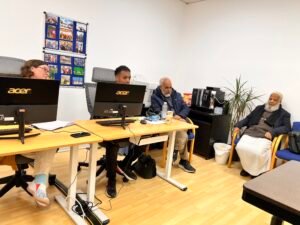
2. **Enhance Language Support Services in Healthcare**
There is an urgent need for multilingual healthcare support, particularly for telephone and in-person consultations. Providing interpreters or offering multilingual staff could help patients communicate their needs more effectively, ensuring they receive appropriate and timely care. Language support should be a standard feature in GP practices, hospitals, and mental health services to address the community’s diverse linguistic needs.
3. **Empower Women Through Health and Lifestyle Programs**
Tailored programs encouraging women to participate in physical activities, healthy eating workshops, and mental health discussions would promote a more active lifestyle. Safe spaces for women to gather, exercise, and discuss health concerns in a culturally appropriate setting would empower them to take charge of their well-being without cultural or social constraints.
4. **Raise Awareness of Chronic Health Conditions**
Educational campaigns on managing diabetes, hypertension, obesity, and COPD are essential to equip the community with knowledge on prevention and self-care. Workshops, pamphlets, and bilingual health materials could be distributed to improve understanding and awareness of these prevalent conditions.
5. **Strengthen Community-Healthcare Provider Communication**
Establishing regular health forums and public consultations with healthcare providers would allow for continuous feedback and ensure that the needs of the Bangladeshi community are met. This approach would also enable healthcare providers to gain insight into cultural and linguistic nuances that may impact patient care.
### Conclusion and Future Steps
The public consultation conducted by the Cohesive Society CIC and Social Prescriber Northamptonshire was a resounding success. The two days of in-depth, face-to-face discussions were invaluable in uncovering the specific health challenges faced by the Bangladeshi community in Northamptonshire’s inner-city areas. The event provided an eye-opening view into the systemic and cultural barriers that affect community members’ access to healthcare, mental health services, and opportunities for a healthier lifestyle.
Moving forward, the Cohesive Society CIC is committed to working closely with healthcare providers, local authorities, and community organizations to implement the proposed solutions. By addressing these challenges head-on, we aim to create a more inclusive, accessible healthcare system that respects and meets the unique needs of the Bangladeshi community. Together, we can promote a future where everyone has equal access to quality healthcare, improved mental well-being, and the resources needed for a healthy life.
For more information on this initiative and other community projects, please visit [www.cohesivesociety.org](http://www.cohesivesociety.org) or contact us at **01604 312 140**.
